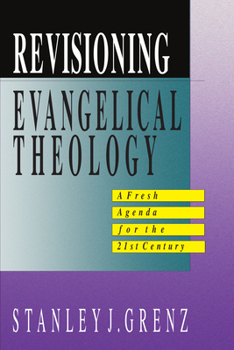Revisioning Evangelical Theology
Select Format
Select Condition 
Book Overview
Stanley J. Grenz evaluates the course of evangelical theology and sets out a bold agenda for a new century. He proposes that evangelical theology, to remain vibrant and vital in the postmodern era, should find its central integrative motifs in the reign of God and the community of Christ.
Format:Paperback
Language:English
ISBN:0830817727
ISBN13:9780830817726
Release Date:March 1993
Publisher:IVP Academic
Length:208 Pages
Weight:0.05 lbs.
Dimensions:0.6" x 6.0" x 8.9"
Customer Reviews
3 ratings
Revisioning Evangelical Theology
Published by Thriftbooks.com User , 15 years ago
A constructive endeavor is Stanley J. Grenz's Revisioning Evangelical Theology: A Fresh Agenda for the 21st Century (Downer's Grove: InterVarsity Press, c. 1993). Grenz taught theology at Carey/Regent College in Vancouver, B.C., and wrote out of the Baptist (Southern Baptist, if I read him rightly) tradition. He joins David Wells, Tom Oden, Stanley Hauerwas, and others in declaring that the Enlightenment-engineered era often called "modernity" has passed. Its blissful optimism in human goodness and progress, its narrow rationalism (disguised as "reason" and long regnant in academia), increasingly appear as dead as dinosaurs. We have entered a new epoch in history and need to cast loose any anchors we've had lodged in that distinctly anti-Christian mindset. "In fact," he says, "we may be in the midst of a transition rivaling the intellectual and social changes that marked the birth of modernity out of the decay of the Middle Ages. The world appears to be entering a new phase of history, often designated--for lack of a better term--postmodernity" (p. 14). What that means for evangelicals is this: we need a "rebirth of theological reflection" which "can lead to a renewal of our understanding of who we are as the people of God" (p. 17). To address that task Grenz has written this treatise, which begins with "revisioning evangelical identity." Historically, "evangelicalism" emerged as a consequence of the 16th century Protestant Reformation (with its three solas: sola scriptura, sola gratia, sola fide), refined in the 17th century by English Puritanism and German Pietism, finally forged by revivalism in America in the 18th and 19th centuries. That "convertive piety" which so largely shaped the United States has largely faded in the 20th century as Modernism and Fundamentalism buried it--though in radically different ways. Since WWII, however, a "New Evangelicalism," evident in Billy Graham Crusades and Christianity Today, has rallied recruits and emerged as a powerful force in this nation's religious life. Beyond a revisioned identity, evangelicalism needs a revisioned "spirituality," Grenz thinks, which is better attuned to its earlier Puritan and Pietist roots. As he defines it, such spirituality "is the quest, under the direction of the Holy Spirit but with the cooperation of the believer, for holiness. It is the pursuit of the life lived to the glory of God, in union with Christ and out of obedience to the Holy Spirit" (p. 42). Authentic faith enkindles what Jonathan Edwards called the "religious affections." Holy Love must enliven Christian experience. More than mere doctrinal affirmations make one a "believer," for a heart-felt commitment to Jesus is at the heart of real faith. Personal response to God's grace, commitment to His guidance, nurturing the inner life of the soul, all make one truly Christian in the Evangelical sense. Still more: Evangelicals must "revision" theology. Here Grenz shares D
This is pretty well documented book
Published by Thriftbooks.com User , 17 years ago
I have read several books by Stanley Grenz and I like very much his writing stile and the way he provides an abundant and excellent documentation on the subject matter he is writing about.
The future of "evangelical" theology
Published by Thriftbooks.com User , 24 years ago
Well, if you want to see where evangelical theology is going, this is the book to read. Grenz certainly deserves credit for his constant presence on the cutting edge of theological developments. Here he presents his "fresh agenda" for theology in the 21st century. One thing is clear: Grenz is evangelical in name only. The theology he lays out would better be labeled 'post-evangelical' because he rejects almost every sacred tenet of evangelicalism.Perhaps the central theme is the rejection of what Lindbeck called the 'cognitive-propositionalist' model of theology. Grenz treats doctrine as a 'cultural-linguistic' set of rules that govern community behavior, not as propositions which reflect reality. His doctrine of Scripture suffers accordingly as he reduces it to a mere narrative whose authority derives from its usefulness to the community, not from its truth value. Not surprisingly, he concludes his book by calling for a shift in theology's integrative motif from the traditional 'kingdom concept' to a more communitarian ideal.Grenz and his compatriots, Clark Pinnock, Donald Bloesch, Gabriel Fackre and Robert Webber will undoubtedly plunge evangelicalism into yet another identity crisis. What will emerge is anyone's guess.






